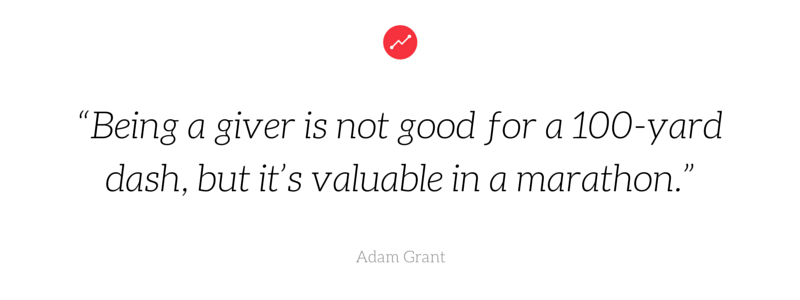
There are three types of people: givers, takers, and matchers.
Givers are the people you look forward to connecting with. They always seem to have your best interests in mind and never fail to go beyond what’s expected of them. They don’t keep score, they just give.
Takers are leeches. It’s obvious that they’re only interested in their own pursuits. They’re nice to you to the extent that they need you and not a moment longer.
Matchers are somewhere in between. They keep score — but they’re careful to maintain a healthy balance in their relationships. They give when they need to and take when it’s warranted.
Who’s more likely to succeed? Givers, takers, or matchers?
Adam Grant, the youngest ever tenured professor at Wharton School of Business, dedicated an entire book to answering this question.
Professionally, all three reciprocity styles have their own benefits and drawbacks. But there’s one style that proves more costly than the other two. … Research demonstrates that givers sink to the bottom of the success ladder. Across a wide range of important occupations, givers are at a disadvantage: they make others better off but sacrifice their own success in the process.”
Makes sense. Givers keep lifting others up but rarely look out for themselves. Nice guys finish last, right?
Then again, look who’s at the top of the pile…
Givers dominate the bottom and the top of the success ladder. Across occupations, if you examine the link between reciprocity styles and success, the givers are more likely to become champs — not only chumps.”
Not only do givers occupy the higher rungs of the success ladder, their success also tends to be more spectacular because they help those around them succeed as well.
Givers, takers, and matchers all can— and do— achieve success. But there’s something distinctive that happens when givers succeed: it spreads and cascades. When takers win, there’s usually someone else who loses. Research shows that people tend to envy successful takers and look for ways to knock them down a notch. In contrast, when [givers] win, people are rooting for them and supporting them, rather than gunning for them. Givers succeed in a way that creates a ripple effect, enhancing the success of people around them. You’ll see that the difference lies in how giver success creates value, instead of just claiming it.”
Bottom line? To stay right in the middle of the pack — be a taker or a matcher. But to climb your way to the top, find ways to start giving more in your relationships without keeping score.
Here’s a quick strategy — courtesy of Adam Grant himself — to get started today:
If you decide to shift in the giver direction, my favorite strategy is what one of America’s top networkers calls the five-minute favor. The key is to look for ways to help others that are relatively low-cost to you. It might be making an introduction between two people who could benefit from knowing each other, sharing an interesting article, or offering to provide advice or feedback. If you choose a form of helping that you find enjoyable and meaningful, it might even boost your mood and energy.”
Further reading on Adam Grant’s research: